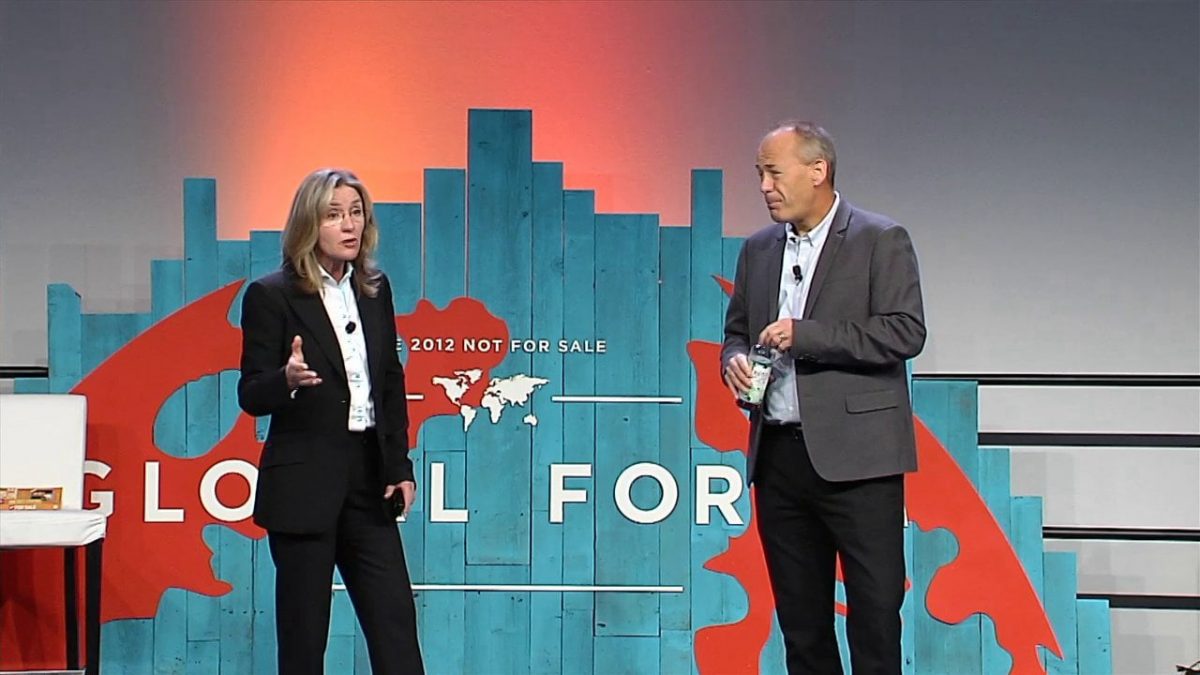Kim Perdikou graduated from Pace with an MS in Information Systems in 1993. She has held positions with companies like Dun & Bradstreet, Reader’s Digest and was the CIO then Executive Vice President at Juniper Networks. She has been the Chairwoman of the Board of Directors of iPhotonix, an Optical and SDN company, since April 2015. She is also an Investor and Chairwoman of the Board of REBBL, an herbal beverage company. Kim additionally serves as a Board Director of CyberArk, a technology cyber security company. She is also a member of the Advisory Board for Trunomi, a financial technology company.
She’s also an incredible human rights advocate. As an incredibly accomplished alumna, Kim has had a lot of experience which helped her uncover one of her strongest passions: fighting the global problem of human trafficking. We spoke with Kim about her experiences and unique perspective.
What was your journey to your current position as Chairwoman of the Board of Directors at iPhotonix like?
 I had been invited to dinner with a friend in Bermuda and met a young couple who were on holiday. The guy was in a startup and was friends with the CEO of iPhotonix. When the CEO was looking for a new board member, he reached out to me. I joined the board and, when the chairman left (his company was acquired and there was a conflict of interest), the shareholders asked me to be chairwoman. I did say no for about an hour and then they congratulated me! Case closed.
I had been invited to dinner with a friend in Bermuda and met a young couple who were on holiday. The guy was in a startup and was friends with the CEO of iPhotonix. When the CEO was looking for a new board member, he reached out to me. I joined the board and, when the chairman left (his company was acquired and there was a conflict of interest), the shareholders asked me to be chairwoman. I did say no for about an hour and then they congratulated me! Case closed.
Did you come across unique challenges as a woman in technology?
When I was 5 my mother saw a program on TV about mathematical children who are different and she tried to contain me in that ‘different’ box because I was very into math. What happened was I thought if I am different I am going to be different on my terms!
So I was. One time when my father sold a car at work and came home, he brought a new record player – the first we ever had. My brother and sister sat and watched the record go round and sang to the songs and I sat at the other end of the table, aged 5, counting the money. I did the taxes for my dad’s business when I was 12.
When I discovered there was a glass ceiling, I realized “I’m never going to be a director.” My husband didn’t understand because he’d started his own businesses and done everything he’d wanted. “Don’t be ridiculous, it’s all in your head,” he told me, and even though it isn’t all in your head, he was right: my own behavior was stopping some of my progress, so I had to change my behavior.
I had this very wrong belief that if you worked really hard your boss would recognize it and you’d eventually get a job doing what you really should be doing. That is utter rubbish. You need to know where you want to go, picture it in your head, and talk to people to find out how to get there. Men know exactly where they want to be. Part of the behavior is our own behavior – if you go along with what’s expected of you, you won’t ever break free of those expectations.
 I started taking steps to change my behavior. Here’s an example: men talk to each other about sports, so I learned to play golf so I could have a conversation with them. I ended up loving golf so much I didn’t allow business on the golf course! And the men enjoyed playing with me so much it normalized our relationships. That allowed me to be seen as a person, rather than a woman who they couldn’t relate to.
I started taking steps to change my behavior. Here’s an example: men talk to each other about sports, so I learned to play golf so I could have a conversation with them. I ended up loving golf so much I didn’t allow business on the golf course! And the men enjoyed playing with me so much it normalized our relationships. That allowed me to be seen as a person, rather than a woman who they couldn’t relate to.
How else did you change your behavior?
I would do things to be helpful that weren’t necessarily part of my job, which would benefit others but not me. For example, a software group was going to be moved to another executive but they didn’t want to move it yet because it was so ‘delicate’. Even though it wasn’t my job, I ended up running it, putting out fires every day, but the other executive was the one getting paid and promoted.
One night, I was complaining about it to my friend and I’ll never forget what she said to me. She told me I was the problem. Because I was the one doing it. I had not set any boundaries. I was the one who was doing work outside my job that someone else was getting rewarded for. I wasn’t very happy to hear it, but she was right. Once I got past how I felt about her ‘advice’, I went into work and asked for a conversation where I told them that, with all the extra work, I’m not focused on the things I should be, and so I’d like to move the software group – and the date I’m going to do it is April X. They said “we can’t do that to this guy!” and I replied “they are moving the only decision to be made is who they will report to.”
 Breaking the mold is key
Breaking the mold is key
Everybody who is not happy in their careers blames “my boss, my this, my that,” but it’s up to them to change their situations.
You will not change what other people do, but you can change how you behave, how you react, and where you want to go.
If you want a job, you have to ask for it. Don’t sit back and wait for someone to recognize your talents. Ask for promotions in a non-confrontational way without time pressure. And don’t start doing the job until it’s actually yours.
When going for a promotion or new job, I learned that talented executives would outline a plan of what they were going to do and wouldn’t actually do it until they had the job and budget to accomplish it. Once I started to learn how people did things at the executive level I became a lot more prepared. I would have a list of things I would do and things I would not do. And I would stick with it.

Tell us about your work with REBBL and Slavery is Over? Why is it important to you?
Juniper Foundation built a relationship with Not for Sale (NFS), which is an innovative not-for-profit to re-abolish slavery. When I learned that there are more slaves in the world today than when slavery was first abolished I knew something different had to be done to solve it.
My friend Dave Batstone, Founder of NFS, had the idea of creating companies in the most economically challenged areas, where people who are the most vulnerable to slavery live, in order to address the supply chain and change the economics of the area.
There are so many vulnerable people in the world. They are vulnerable because they are so poor: there are no jobs, no money to be made, so when somebody shows up in their village promising them jobs and money overseas they jump at the chance.
They are told they will be given passports and work visas and that they can work in the USA or UK and make enough to send back home to support their families. Of course they jump at that. But when they arrive in a foreign country with only the person who brought them, they are threatened and told they have to pay everything back at an extortionate price. They are also told they are in the new country illegally, so they are forced into prostitution and other slavery and have to work 24/7 to pay off debts that will never get paid.
Dave’s idea was to disrupt the whole supply chain so that people never got into the position where they were so desperate that they would agree to leave their villages, with these people, in the first place. So several companies that were mainly dependent on labor in those villages were created. We wanted to create jobs with dignity, so looked for reasons and valuable commodities a company could use from the area to create business in specific locations.
 Dave had a Montara Circle meeting of business, sports and government people to brainstorm ideas in 24 hours. They looked at the Peruvian Amazon where there are villages where whole families are indentured to collecting minerals used in the U.S. car industry. So we looked for something indigenous to the area that was also unique to the area and could be used for business. We discovered an herb called cat’s claw. We ended up creating REBBL, a beverage company that creates drinks from cat’s claw and other indigenous ingredients. The product is very good – and that is important for financially successful businesses. But the true difference is the impact of a clean dignified supply chain created which can give back to fund the next set of businesses. 2.5% of REBBL’s revenue is donated to creating new businesses, so the whole network feeds itself.
Dave had a Montara Circle meeting of business, sports and government people to brainstorm ideas in 24 hours. They looked at the Peruvian Amazon where there are villages where whole families are indentured to collecting minerals used in the U.S. car industry. So we looked for something indigenous to the area that was also unique to the area and could be used for business. We discovered an herb called cat’s claw. We ended up creating REBBL, a beverage company that creates drinks from cat’s claw and other indigenous ingredients. The product is very good – and that is important for financially successful businesses. But the true difference is the impact of a clean dignified supply chain created which can give back to fund the next set of businesses. 2.5% of REBBL’s revenue is donated to creating new businesses, so the whole network feeds itself.
You can change the world. The way to do it in any sustainable fashion is the same as anywhere else: through economics.


